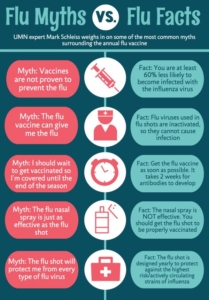Flu Facts: What you need to know this season

Flu Facts: What you need to know this season
Contributed by Kris Baydalla-Galasso
We are rapidly approaching the holiday season, and carving pumpkins turns into carving turkeys and decking the halls, we all need to be reminded and aware of the uninvited guest: Influenza. There are a few important things you need to remember about the flu:
- The “flu” or influenza is caused by the Human Influenza A, B and C Viruses
- Symptoms typically appear 1-4 days after exposure
- Symptoms include fevers of over 100 degrees, cough, nasal stuffiness, weakness, congestion, muscle aches, general fatigue, sore throat, chills and sweats
- Symptoms often last for at least a week or two, sometimes longer
- You are contagious for about a day before you have symptoms and for about a week after your symptoms start
- You get the flu by breathing. Tiny droplets are inhaled and spread the virus.
If you bring yourself to the doctor within 24-48 hours of the onset of symptoms, antivirals can be prescribed and may significantly decrease the duration of your illness. It is critical that you pay attention to your symptoms and react quickly to minimize the impact of your illness.
The best way to attempt to prevent the flu is by receiving a flu vaccination. That, combined with consistent hand washing and limiting contact with individuals known to have the flu, will limit the spread of the virus.
Flu vaccinations are completely covered by insurance and many major chains are incentivizing customers to stop in and receive the vaccine while they shop.
It is critical to get the Flu vaccine before the flu is spreading throughout your area. The earlier in the season that vaccination occurs, the more likely you are to receive maximum protection. The CDC recommendation is that vaccinations be received in October. This year, many communities are reporting cases of the flu already, and some have even reported deaths attributed to the flu.
It takes two weeks from the time of vaccination for the antibodies to develop against the flu. While many are skeptical of vaccination, the flu vaccine does not “cause” the flu. It does, however, give the body the best protection against a virus that does, in fact, kill.


















